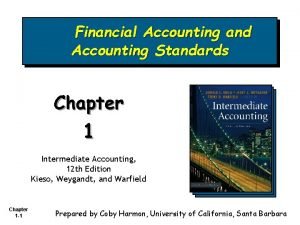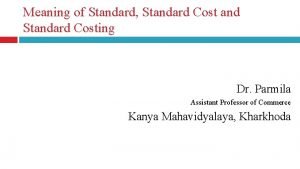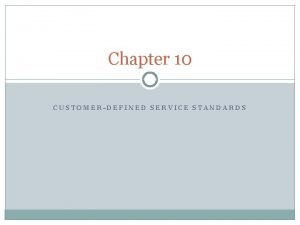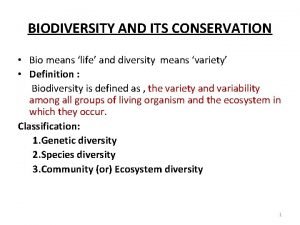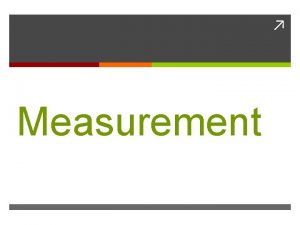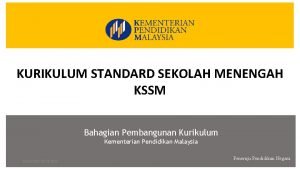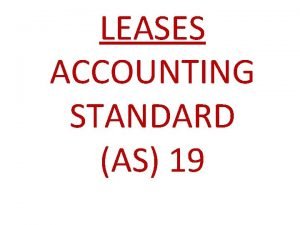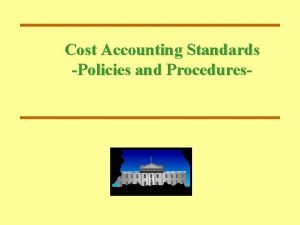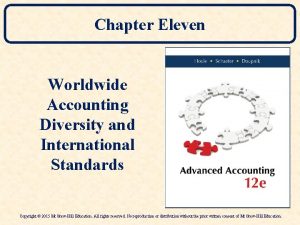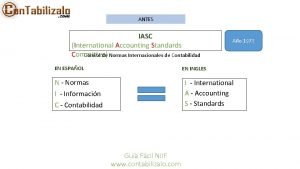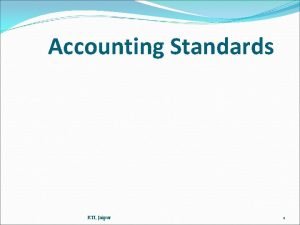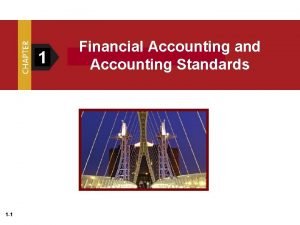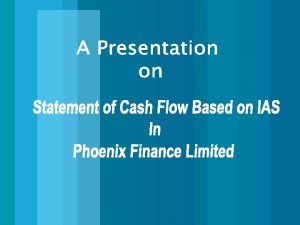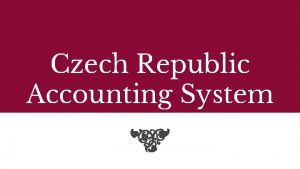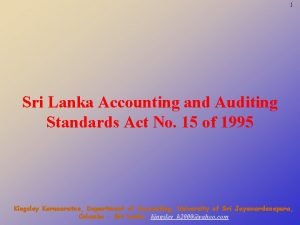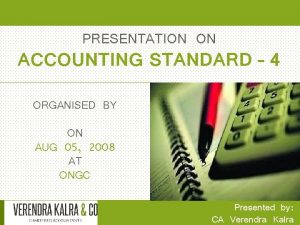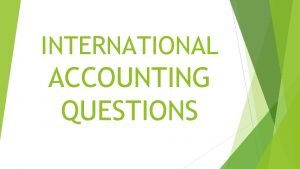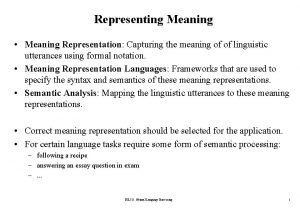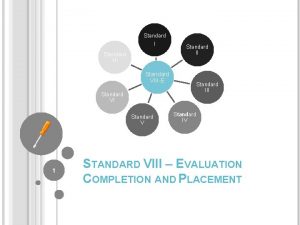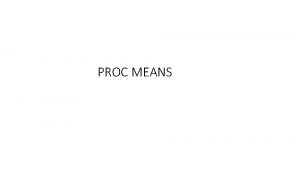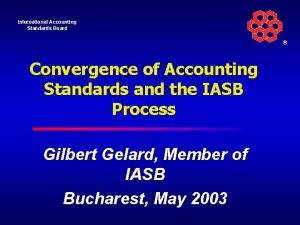Topic Meaning of Accounting standards Accounting standard means




























- Slides: 28

Topic:

Meaning of Accounting standards Accounting standard means a rule or guideline for how financial activities are recorded and reported to third parties. Accounting standards are authoritative standards for financial reporting and are the primary source of generally accepted accounting principles (GAAP). Accounting standards specify how transactions and other events are to be recognized, measured, presented and disclosed in financial statements. The objective of such standards is to provide financial information to lenders, investors, creditors, contributors and others that is useful in making decisions about providing resources to the entity.

Existing Standards In India, Accounting Standards (AS) have been issued/ amended by the ASB of ICAI from time to time, to establish uniform standards for preparation of financial statements, in accordance with generally accepted accounting practices (GAAP) in India and for better understanding of the users. The ASB of ICAI has issued 32 accounting standards so far. AS 1 Disclosure of Accounting Policies AS 2 (Revised) Valuation of Inventories AS 3 (Revised) Cash Flow Statements AS 4 (Revised) Contingencies and Events Occurring after the Balance Sheet Date AS 5 (Revised) Net Profit or Loss for the period , Prior Period Items and changes in accounting Policies AS 6 (Revised) Depreciation Accounting

AS 8 (Withdrawn) Accounting for research and development AS 9 Revenue Recognition AS 10 Accounting for Fixed Assets AS 11 (revised ) The Effects of Changes in Foreign Exchange Rates AS 12 Accounting for Government Grants AS 13 Accounting for Investments AS 14 Accounting for Amalgamations AS 15 (Revised) Employee Benefits AS 16 Borrowing Costs AS 17 Segment Reporting AS 18 Related Party Disclosures AS 19 Leases

AS 20 Earnings Per Share AS 21 Consolidated Financial Statements AS 22 Accounting for Taxes on Income AS 23 Accounting for Investments in Associates in Consolidated Financial Statements AS 24 Discontinuing Operations AS 25 Interim Financial Reporting AS 26 Intangible Assets AS 27 Financial Reporting of Interests in Joint Ventures AS 28 Impairment of Assets AS 29 Provisions , Contingent Liabilities and Contingent Assets

Non mandatory AS AS 30 Financial Instruments: Recognition and Measurement AS 31 Financial Instruments: Presentation AS 32 Financial Instruments: Disclosures

Nature of Accounting Standards Accounting standards usually consists of three parts: A description of the problem to be tackled. A reasoned discussion (theories) or ways of solving the problem. Then, in line with the decision or theory, the prescribed solution. Approaches to standard setting Representational faithfulness approach, Economic consequences approach.

Types of Accounting Standards As per the subject matter and its enforcement, standards may be as follows: Disclosure Standards: These are the minimum uniform rules for external reporting which require only an explicit disclosure of accounting methods used. Presentation Standards: They specify the form and type of accounting info to be presented in a particular order in financial statements. Example- funds flow statements. Content Standards: These standards specify the accounting information which is to be published or

Benefits of Accounting Standards To improve the credibility and reliability of financial statements. Determining managerial accountability. Provides guidelines and rules of action. Reform in accounting theory and practice.

Institutions Involved in Indian Standards Setting A. Accounting Standards Board (ASB) Recognizing the need to harmonize the diverse accounting policies and practice in India and keeping in view the international development in the field of accounting, the ICAI constituted the ASB in April 1977. The ASB is entrusted with the following functions: To formulate Accounting standards which may be established by the Council of ICAI in India. To persuade the concerned parties to adopt them in the preparation of financial statements. To issue guidance notes on the Accounting standards and give clarifications on issues arising there from.

B. National Advisory Committee on Accounting Standards(NACAS) NACAS was constituted for the first time in August, 2001. Accounting standards in India now mean the standards of accounting recommended by the ICAI and prescribed by the Central Government in consultation with the NACAS constituted under Sec. 210 A (1) of Companies (Amendment) Act, 1999. Objectives : The NACAS shall give its recommendation to the Central Government on such matters of accounting policies and standards as may be referred to it for advice from time to time. Members : The NACAS consists of 12 members, with a representative each from the ICAI, ICMAI, ICSI, Central Government, RBI, Comptroller & Auditor General of India, academics, CBDT, SEBI and two members to represent the chambers of commerce and industry to be nominated by Central Government.

Standard Setting process in India Identification of Broad areas Finalizatio n of standards Consideration of standard by Council Constitution of Study Groups Circulation of Exposure Drafts Issue of Standard Preparation of Preliminary Drafts Preparation of Exposure Drafts

Accounting Standards Setting in USA Accounting standard setting has a long history in USA. Financial accounting and reporting standards were established first by the Committee on Accounting Procedure (CAP) of the American Institute of Certified Public Accountants (AICPA - 1939 - 1959) and then by the Accounting Principles Board (APB), also a part of AICPA (1959 -1973). The Financial Accounting Standards Board (FASB) has been the designated organization in the private sector for establishing standards of financial accounting and reporting since 1973. The standards issued by the FASB govern the preparation of Financial reports in USA.

Institutions Involved in US Standards Setting Financial Accounting Foundation (FAF) The FAF supports and oversees the FASB. Established in 1972, the FAF is the independent, private-sector, not-fororganization responsible for the oversight, administration, financing, and appointment of the FASB and Governmental Accounting Standards Board (GASB). The Financial Accounting Foundation (FAF) is responsible for: Selecting the members of the FASB and its advisory council, The FASB And the GASB are charged with setting the highest -quality standards through a process that is robust, comprehensive, and inclusive. The FAF management is responsible for providing strategic counsel and services that support the work of the standard setting Boards. The FAF Trustees are responsible for providing oversight and

Financial Accounting Standards Board (FASB) FASB established in 1973, is the independent, private-sector, not-for-profit-organization that establishes financial accounting and reporting standards for public and private companies and NPOs that follow GAAP. The FASB is recognized by the Securities and Exchange Commission (SEC) as the designated accounting standard setter for public companies. The FASB develops and issues financial accounting standards through a transparent and inclusive process intended to promote financial reporting that provides useful information to investors and others

Financial Accounting Standards Advisory Council (FASAC) The FASAC has responsibility for consulting with the FASB as to technical issues on the Board's agenda, project priorities, selection and organization of task forces and matters likely to require the attention of the FASB. The Council has more than 30 members who are broadly representative of preparers, auditors and users of financial information.

American Institute of Certified Public Accountants (AICPA) The AICPA is the national professional organization for Certified Public Accountants (CPAs) in the U. S. It was founded in 1887 and upon its creation, established accountancy as a profession distinguishing it from other professions. The AICPA sets ethical standards for the profession and U. S auditing standards for private companies, NPOs, federal, state and local governments. The AICPA provides technical support, standard-

Emerging Issues Task Force (EITF) The EITF was formed in 1984 by the FASB in order to assist the Board in improving financial reporting through the timely identification, discussion, and resolution of financial accounting issues within the FASB Accounting Standards Codification. Any EITF proposed changes are subject to endorsement by the FASB.

An Open Decision-making (Due) Process. FASB Technic al Agenda Appointmen t of advisory task force Tentative conclusion s by FASB Analysis of comment letters Public exposures of standards Accessibili ty of meetings Revised Exposure Draft ( if needed) Approval of final pronouncemen t

Standards Setting by IASB International Accounting Standards Board (IASB) is established to provide the world's integrating capital markets with a common language for financial reporting. IASB is an independent standard-setting board, appointed and overseen by a geographically and professionally diverse group of Trustees (IASC Foundation) and supported by an external advisory council (SAC) and an interpretations committee

Institutions Involved in International Standards Setting International Accounting Standard Board (IASB) The International Accounting Standards Board was established in 2001 as the successor organization to IASC which had been setting international accounting standards since 1973. IASB is an independent, private-sector body that develops and approves IFRS. The IASB operates under the oversight of the IFRS Foundation. It is the standard setting body of IFRS foundation which consists of 15 members from various countries. IASB’s role Full discretion in developing and pursuing its technical agenda.

IFRS Foundation The IFRS Foundation is an independent body that oversees the International Accounting Standards Board (IASB). It was formed in March 2001, as a not-for-profit corporation incorporated in the State of Delaware, US. The IFRS Foundation functions through its Trustees. There are 22 Trustees. The governance of the IASB and its related bodies is ultimately in the hands of the Trustees of the IFRS Foundation. Responsibilities Establishing and maintaining appropriate financing arrangements. Establish or amend operating procedures for the trustees. Review the location of IFRS foundation.

IFRS Advisory Council The IFRS Advisory council of the IASB provides a forum where the IASB consults individuals and representatives of organizations affected by its work, that are committed to the development of high quality International Financial Reporting Standards (IFRSs). Objectives It gives advice to the IASB on a range of issues which includes, but is not limited to, the following : Input on the IASB’s agenda; Input on the IASB's project timetable (work programme) including project priorities, and Advice on projects, with particular emphasis on practical application and implementation issues, including matters relating to existing standards that may warrant consideration by the IFRIC.

International Financial Reporting Interpretations Committee (IFRIC) This is l. ASB's interpretative body. The IFRIC reviews on a timely basis within the context of current IFRSs and the IASB Framework, accounting issues that are likely to receive divergent or unacceptable treatment in the absence of authoritative guidance, with a view to reaching consensus on the appropriate accounting treatment. Objectives of the IFRIC To provide timely guidance on newly identified financial reporting issues not specifically addressed in IFRS. To cover those issues of interpretations where unsatisfactory or conflicting interpretations have

IFRS Foundation IFRS Advisory Council IFRIC

Process for developing IFRS by IASB IFRS Standards are developed through an international consultation process involving individuals from around the world. It includes six stages: Setting the agenda. Planning the project. Developing and publishing the Discussion Paper. Developing and publishing the Exposure Draft. Developing and publishing the standard. Procedures after a standard is issued.

Stages are: Agenda Consultation 3 -5 year plan Research Proposal Discussion Paper Request for Information Implementation PIR Research Programme IFRIC Narrow-scope Standards Programme Final IFRS Exposure Draft

Thank you Presented By: Name : Janvi Sood Roll No. : 03 Name : Bhumika Sharma Roll No. : 31 Class : BCom 3 A
 Financial accounting and accounting standards chapter 1
Financial accounting and accounting standards chapter 1 Broad topic and specific topic examples
Broad topic and specific topic examples Topic down
Topic down Meaning of accounting standard
Meaning of accounting standard Standard costing is
Standard costing is Favorite transport
Favorite transport Means of communication computer
Means of communication computer Hard customer defined standards
Hard customer defined standards If poly means many, what is gon?
If poly means many, what is gon? Meta'' means morphe'' means
Meta'' means morphe'' means Meta and morph means
Meta and morph means Define biodiversity conservation
Define biodiversity conservation Bio means 'life
Bio means 'life Standard error of mean
Standard error of mean Difference between home language and standard language
Difference between home language and standard language Peruntukan waktu kssm pendidikan khas
Peruntukan waktu kssm pendidikan khas Local accounting
Local accounting As-19
As-19 Accounting standards committee of germany
Accounting standards committee of germany Cost accounting standards
Cost accounting standards Reasons for accounting diversity
Reasons for accounting diversity Contabilizalo.com
Contabilizalo.com Rti jaipur
Rti jaipur Accounting standards
Accounting standards International accounting standards ias
International accounting standards ias Czech accounting standards
Czech accounting standards Sri lanka auditing standards
Sri lanka auditing standards Accounting standard 4
Accounting standard 4 International accounting questions and answers
International accounting questions and answers
